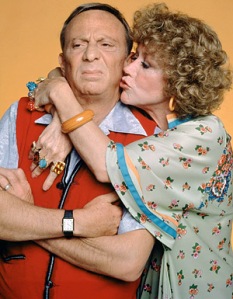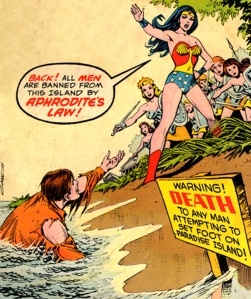
Jered McLenigan in Lantern Theater’s Julius Caesar. Photo by Mark Garvin.
This is a piece about the Wooster Group’s production of Cry, Trojans!, Lantern Theatre’s production of Julius Caesar, the Lean In/Getty stock photography collaboration, and my head finally exploding all over my computer.
Privilege is a squirrelly thing. When your privilege is working for you, it’s undetectable to you. That’s its job: to silently ease your way through life by protecting you from the thousand little (or big, or enormous) roadblocks people without your privilege face every day.
Two examples from my own life on both sides of privilege:
I taught for a long time at a film school. I taught early-career filmmakers about casting, working with actors, and script development. One semester, a young Black man had written a short film script about four young Black men being pulled over. The police officer asked all four for their IDs. I told this young filmmaker that he would need to clean up his narrative– that it didn’t make sense for the officer to ask for the IDs of passengers unless he had some reason, and the script needed to provide that narrative bridge. I had four young Black men in that class and all four were immediately astounded. They had been asked for their IDs as passengers every single time they had ever been in a car that had been pulled over. They believed it was normal. I had never once been asked for mine as a passenger, and had never even heard of such a thing. I had been protected by my privilege so completely that I had had no idea I was even being protected. I began to wonder what else these young men were experiencing that was invisible to me.
When my son was little, he went to a Jewish preschool. I didn’t talk to him much about Christmas or Easter. When he was almost three, we were headed into a supermarket that had just been decorated for Christmas, as they are always an orgy of Christian heritage between September and January. My son pointed at a giant Santa and said, “Look, Mommy! A king!” And I was overwhelmed with unexpected gratitude that my son was, for the moment, protected from the full knowledge of his outsider status in our culture. It wouldn’t take long for him to understand. But for the moment, his lack of Christian heritage privilege was completely unknown to him.
What we know about our own privilege is always a process, and one we have to struggle for, since it involves active curiosity and empathy, two things humans are just abysmal at, despite our constant assurances to each other of the contrary. But an understanding of the shape of one’s privilege, as hard-won as that is, is just the first step if you’re interested in social justice. The second step is, you know, WORKING for social justice. Unfortunately, that involves actively working against your own privilege, and there is nothing humans hate more than that.
So we find subtle ways to fool ourselves (and others) into IMAGINING we’re working for social justice while ACTUALLY reinforcing (in grad school, we called this “reinscribing”) our own privilege and cultural superiority.

Cry, Trojans! Photo by Paula Cort.
The Wooster Group is well known to you if you have a degree in theatre, or were plugged into the theatre community in the 80s. Most people know about it as the New York-based company that gave birth (so to speak) to Spalding Gray. Some people will recall its tradition of experimental deconstructions of classic works and nonlinear, aggressively designed original works in what we once called a “postmodern” style. Headed by Liz LeCompte, Wooster Group has an almost legendary status for what was, for its time, very experimental theatre. Lantern Theater is a company in Philadelphia that’s in its 18th season. A quick glance at their production history reveals a very prosaic aesthetic, featuring unremarkable, utterly safe works such as The Screwtape Letters by C.S. Lewis, The Liar by David Ives, Private Lives by Noel Coward, and The Beauty Queen of Leenane by Martin McDonough, in addition to lots and lots of Shakespeare.
So here comes the part where my head begins to explode:
These two companies, almost at completely opposite ends of the theatrical spectrum, both pulled the exact same stunt at the exact same time: They staged shows featuring non-white characters and cast those characters with primarily white actors. Cry, Trojans!, an adaptation of Shakespeare’s Troilus and Cressida, was originally conceptualized as a collaboration with the RSC and performed in London, and was reconceptualized for an American run. Originally, the Americans played the Trojans and the British played the Greeks, rehearsing the scenes separately until coming together just before opening. Wooster Group played its Trojans as “Native Americans” against the British playing the Greeks as modern soldiers. For the American run, LeCompte decided to make both sides “Native American,” using a fusion of appropriated costumes, props, and other imagery gleaned from books, films, and other materials– and an almost entirely white cast. Lantern Theater, remarkably, staged Julius Caesar in feudal Japan– but without Japanese actors, instead casting seven white people and one Latino, with African American actor Forrest McClendon as Caesar. (I highly recommend looking at actor Makoto Hirano’s letter to Lantern Theater about the cultural appropriation in their production.)

JC Guzman and Forrest McClendon in Lantern Theater’s Julius Ceasar. Photo by Mark Garvin.
At this point, when the national theatre community has been decrying cultural appropriation, yellowface, brownface, and the like loudly and vigorously and at great length, it seems almost a deliberately retrogressive act. But here’s where privilege steps in and allows people to make decisions like these without understanding how deeply problematic they are.
Both Liz LeCompte and Charles McMahon (the director of Julius Caesar) believe they are working for a HIGHER CAUSE.
“Plus it’s not about that. It’s about everything bigger…We love the piece, we love the stories, we love the films, we love the people…We wanted to tell the story in this way and make it so big that this [lack of direct Native American input] wouldn’t be a problem.” — Liz LeCompte, quoted here (emphasis mine)
“’We wanted to get away from all of the clichés and assumptions about classical Rome, with people walking about in togas and looking like statues from antiquity,’ says artistic director Charles McMahon. ‘Our associations with that make it feel like we’re saying, ‘This is old, this is long in the past” . . . McMahon also wanted to avoid the specificity that comes with updating the play to the modern day. ‘We didn’t want to say this play is like Libya, or this play is like Central America or Russia or North Korea, because that’s not the point either. I think there’s something universal about it.‘ McMahon soon realized that the stoicism of Caesar’s Rome had strong philosophical parallels with Japan’s tradition of Zen Buddhism. ‘The ideas in this play of being detached from the results of actions and being emotionally remote from the events of the world are present in the great samurai epics. So these themes all seemed to add up to feudal Japan being a very resonant scenic and thematic environment to put the play in.'”– read Shaun Brady’s whole article here, emphasis mine
LeCompte clearly thinks that her artistic vision is “bigger,” and therefore more important than issues around cultural appropriation or racism. She believes that the importance– the “bigness”– of her artistic point of view about Shakespeare’s Troilus and Cressida should eliminate the need for an examination of the racial politics she puts onstage. She overtly asserts her artistic vision’s cultural superiority over any issues of race. She has no interest in an artistic exploration of Native American cultures. She’s appropriating various aspects of Native American cultures to make what she overtly states is a more important artistic point.
MacMahon states that the way he could get his (mostly white) audience to associate emotional distance with Julius Caesar was to visually associate the play with SAMURAI FILMS. He has no interest in an artistic exploration of feudal Japan. He’s interested in importing a feeling of stoicism, manliness, and ass-kicking fighters to a mostly white audience, and is appropriating the cultural artifacts of fuedal Japan as an artistic shortcut. He’s appropriating a very specific culture and calling it “universal” because he’s imagining the feeling he gets from watching Kurosawa, not the cultural heritage of a real people whose descendants are alive and marginalized.

Cry, Trojans! Photo by Paula Cort.
LeCompte and McMahon are using artifacts of other cultures– both groups currently marginalized in the US– while shutting out the people of those cultures from the artistic process because they believe their artistic vision is MORE IMPORTANT. They see these cultures as visual art available for their use, not as an inextricable part of the heritage of real, living people. They have reinforced their own privilege and cultural superiority, maintained the invisibility of those marginalized peoples, AND set themselves up as answering to a higher artistic calling– in LeCompte’s case, the “bigger” nature of her artistic vision, and in McMahon’s case, “universality.”
The Lean In/Getty stock photo collaboration is pretty much the same thing, but even more blatant. It purports to be a massive new tool for social justice while instead overtly reinforcing privilege to an almost shocking degree. I SHOULD BE USED TO IT. I knew what to expect. But I was still shocked.

If there’s one thing the Lean In/Getty collection has taught me, it’s that photographers love to take pictures of young white women running. It’s like CATNIP to them.
The Lean In/Getty stock photography project crashed onto the internet in a loudly self-satisfied manner, proclaiming itself to be a feminist project– a revolution in stock photography that shows women in new, “more empowering” ways, claiming it will change the way women are perceived in America by changing the imagery associated with us. I reviewed all 2763 images. I set aside any containing children, as that’s a discussion for a different day. I also compared the images to the ones you can already find on existing stock photo sites.
One thing that’s immediately apparent, and for which the Lean In/Getty collection deserves a basket of high-fives, is its inclusion of older women. There are many more older women depicted than you would expect to find in such a collection, and it was damn refreshing. I loved the inclusion of photos of older women being active– biking, dancing, swimming. Another thing the collection does right is show pictures of women doing jobs, as opposed to sexy models pretending to do jobs. Although the vast majority of workplace photos show upscale offices or studios, the few that show blue-collar workplaces do show women who look like they actually belong there, as opposed to a scantily-clad model licking a hammer.

This . . .

. . . as opposed to this.
On the other hand, exhaustingly, almost ALL of the women in these photos, elderly women included, conformed to traditionally acceptable, thin body types.

Out of all the images of adult women without children, exactly FORTY-THREE (by my count) of the pictures in which women’s bodies were visible depicted women who were not thin. That’s one and a half percent. Of those 43, only FIVE showed non-thin women performing any kind of fitness activity, although the Lean In/Getty collection is rife with with women performing fitness activities (especially white women, whose workout depictions make up 10% of all photos, compared to 2.2% of all photos depicting women of color performing a fitness activity or in fitness clothing).
Unbelievably, depictions of professional women were even WORSE. Exactly ONE picture (that I could find– maybe you’ll find one more and bring the grand total up to two) depict a non-thin woman in anything that could be remotely construed as a professional or business setting, although the collection features literally hundreds and hundreds of business-oriented pictures. Searching “business” gets over 600 results, while “professional” gets over 800 results, and they are almost all of thin women. Considering 60% of women in the US are not thin, that’s an aggressive shut-out that feels deliberate. It’s just not believable that such a result was entirely accidental. Since the Lean In collection has been non-stop screaming its feminist awesomeness as empowering for all women since even before it dropped, one is left wondering why the only women worth “empowering” are the 40% who already enjoy thin privilege.
The few non-thin women depicted in a workplace are depicted in low-wage blue collar or service industry jobs (factory workers, custodians). There are a few portraits, mostly of older women. Very few young, non-thin women were depicted at all. For the record, there are precisely two pictures of a visibly disabled woman, both of the same very fit athlete.
Let’s look at some of these pictures:

From the Lean In/Getty collection, from the first page of images returned from the search “business”

From the Lean In/Getty collection, from the first page of images returned from both searches “business” and “professional.”

From istockphoto.com, from the first page of images returned from the search “business.”

From shutterstock.com, from the first page of images returned from the search “professional.”

Lean In/Getty gets a high five for returning images such as this when searching “professional.”

But most of their images look like this.

One of a tiny handful of pictures in the collection of almost 2800 depicting a young, plus-sized woman.

For every picture of a plus-sized young woman, there are literally over 700 of a woman with this body type.
While the Lean In/Getty collection is doing much better with older women than other stock photography sites, it is actively reinforcing the thin privilege the woman behind the Lean In brand, Sheryl Sandberg, and the woman from Lean In who supervised the stock photo project and curated its imagery, Jessica Bennett, currently enjoy, and it can’t be completely irrelevant that Sandberg is now in her mid-forties. What the Lean In project has done, under the guise of “empowering women” through “changing imagery” is reinforce the cultural privilege and dominance of women of Bennett’s and Sandberg’s body type while making an attempt to create more cultural acceptance for women of Sandberg’s age and older, all while blatantly shutting out women without thin privilege, rendering them virtually invisible. While pretending to empower women as a whole, they have instead reinforced their own privilege.

Celebrating with salad! Yes, this was one of the photos the Lean In collection returned when I searched for “celebration.”
Invisibility is a weapon, and it’s the one we most often use to reassert or reinforce our privilege and cultural dominance. If THOSE PEOPLE aren’t there, it’s because they aren’t IMPORTANT ENOUGH TO BE THERE, and the project’s focus is on “more important issues” anyway. You only get answers to the questions you ask, so be prepared, if you want any credibility in this fight for social justice, to ask WHO IS MISSING? And WHY?
Not every project needs to have a representative from every single group, but when we appropriate someone else’s culture while keeping them invisible, or when we purport to stand for a group’s empowerment while shutting out over SIXTY PERCENT of them, we have a problem.













































